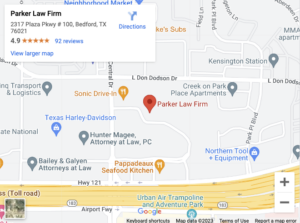
Breach of duty is one of the legal elements of a negligence claim. Most personal injury cases are based on negligence. As the plaintiff (injured party), you must prove that the defendant breached their duty of care, as well as the other elements of your personal injury claim.
The Legal Elements of a Personal Injury Claim
Texas tort laws provide a cause of action for injured parties to seek compensation for their damages. However, the injured person must prove the legal elements of a personal injury claim by a preponderance of the evidence.
The elements of a negligence claim are:
- Duty of care
- Breach of duty
- Causation
- Damages
A legal duty of care requires that a party performs some conduct required by custom, personal commitment, law, or morality. When a party owes you a legal duty of care, they must take reasonable steps to avoid causing you injury or harm.
For example, a property owner owes a duty of care to the people entering their property to provide safe premises. Texas drivers must obey traffic laws designed to reduce the risk of car accidents.
Once you establish that a party owes you a duty of care, you must prove that their conduct breached the duty of care. Proving breach of duty and causation are closely related.
Proving Breach of Duty in a Personal Injury Case in Texas
A party is not expected to be perfect. However, their actions must meet a certain level of care or a jury could find them negligent. The level of care required for a specific situation is determined by the “reasonable person” standard.
Jurors decide what a person of ordinary prudence would have done in a similar situation. In other words, what conduct would be considered reasonable? The standard of care is fact-specific and varies depending on the circumstances of the case.
For example, is it reasonable to text while driving? Would a reasonable person warn guests of a broken railing that could cause a fall?
Once the jurors determine what a reasonable person would have done in the situation, they compare the party’s conduct to that standard. If their conduct fell short of that level of care, they breached their duty of care.
Generally, a person cannot be held liable for the risk of harm they could not reasonably foresee. Likewise, the law generally does not hold a party responsible for factors outside their control.
Linking Breach of Duty To Causation and Damages in a Personal Injury Claim
Proving a breach of duty does not mean the person is legally liable for your damages. You must also prove that the party’s conduct was a direct and proximate cause of your injuries.
For example, you must prove that had it not been for the party’s actions, you would not have been injured (direct cause). Also, you must prove that the person could reasonably foresee the risk of harm from their actions (proximate cause).
Next, you must prove damages. If a party caused your injury, they do not have to pay you if their actions did not cause damages or losses.
Damages in a personal injury case can include non-economic and economic damages such as:
- Physical pain and suffering
- Out-of-pocket expenses
- Medical bills and rehabilitative therapies
- Personal care
- Loss of income and benefits
- Mental anguish
- Decreased quality of life and loss of enjoyment of life
- Emotional distress
- Impairments, disabilities, disfigurement, and scarring
- A decrease in earning capacity and future lost wages
The value of your damages determines how much your personal injury claim is worth. However, other factors could impact how much money you receive. For example, if you are partially to blame for causing your injury, your compensation could be reduced.
Your legal team will work with you to document your damages. In cases involving permanent impairments, they may work with expert witnesses to correctly value future damages for ongoing pain, suffering, and financial losses.
How Long Do I Have To File a Negligence Claim in Texas?
All personal injury claims in Texas have a statute of limitations. The Limitations of Personal Actions statute sets a two-year deadline for most personal injury lawsuits. If you do not file a lawsuit before the deadline expires, you lose your right to pursue your case in court.
Exceptions to the general rule could shorten the filing deadline. For example, claims against government entities require you to file a notice of claim within six months to protect your right to file a lawsuit. However, some cities or counties have shorter deadlines.
Talk with a Bedford personal injury lawyer as soon as possible to protect your right to file a legal claim for damages.
A Bedford Personal Injury Lawyer Can Help You Prove Breach of Duty
When you hire our Bedford personal injury attorneys, we handle all aspects of your claim. Our legal team will work diligently to gather evidence proving the legal elements of your personal injury claim to recover maximum compensation. Contact an experienced personal injury attorney from Parker Law Firm Injury Lawyers today at (817) 839-3143 for an initial free case evaluation.


